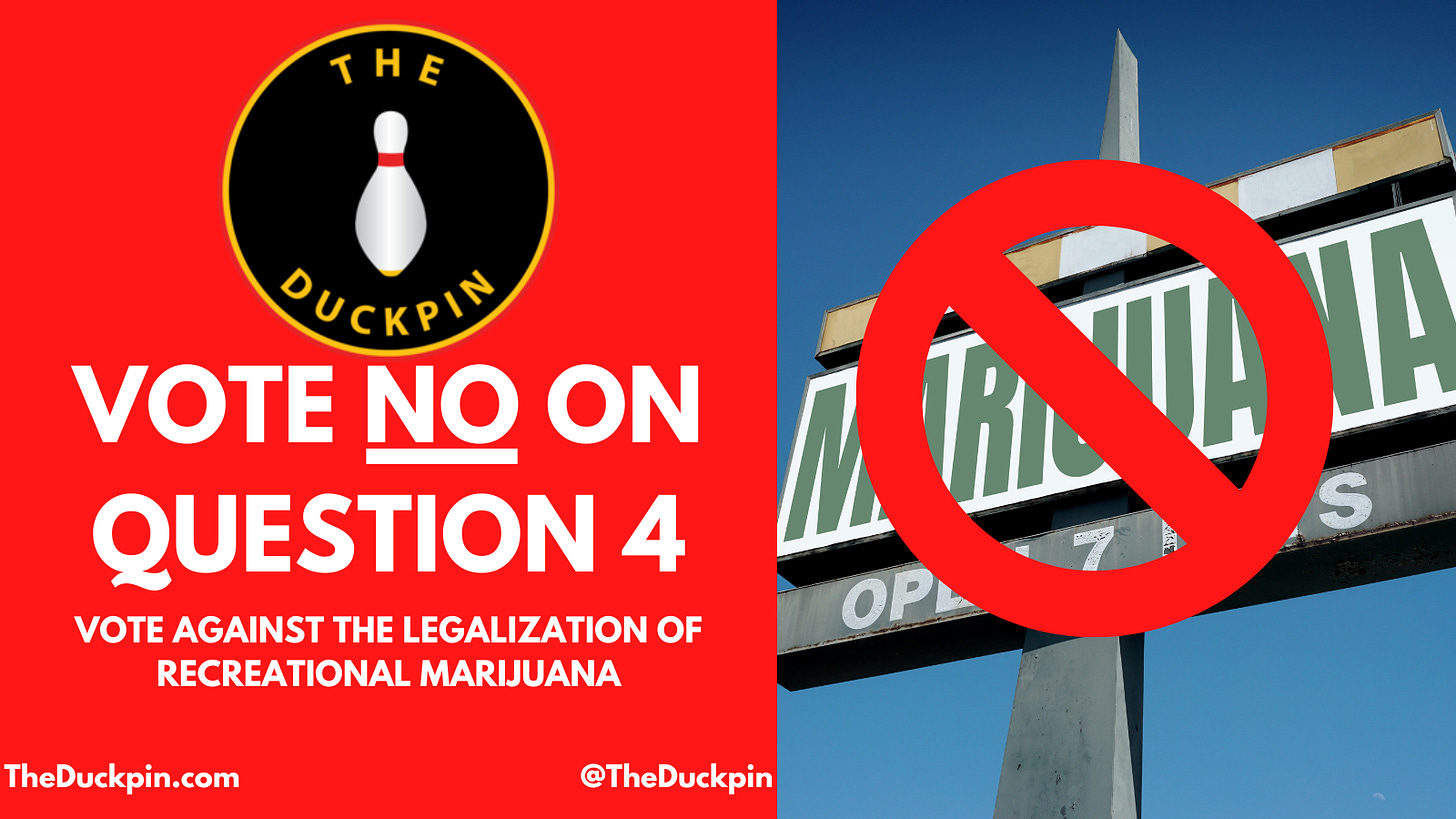Vote NO on Question 4
Maryland has enough problems. We don't need to add recreational marijuana to them
The recent Baltimore Banner/Goucher College poll received headlines for its poll of the Governor’s race between Wes Moore and Dan Cox. One of the other issues polled related to Question #4, the constitutional amendment legalizing recreational marijuana. Of those polled 59 percent supported legalizing marijuana while only 34 percent opposed it.
As they used to teach us in elementary school, just because something is popular doesn’t mean it’s right and just because something is right doesn’t make it popular. There are a multitude of reasons why legalizing recreational marijuana is bad politics and bad policy.
Reason #1: Marijuana is still a federal offense
The ballot measures address the issue of whether marijuana use is legal under state law. However, it does not address the fact that the sale and possession of marijuana is illegal under federal law. Both the Food and Drug Administration and the Drug Enforcement Agency “have concluded that marijuana has no federally approved medical use for treatment in the U.S. and thus it remains as a Schedule I controlled substance under federal law.” Though there has been much sturm und drang regarding federal legalization, it remains a Schedule I controlled substance and its sale and possession are punishable by imprisonment, fines, or both.
Reason #2: Marijuana use is a health risk
As much as legal marijuana proponents would like for you to believe that marijuana is medicinal and that its use is safe, that just is not the case. The research is clear that marijuana is not only an addictive drug that harms the mental and physical health of those who use it. Many folks who want to legalize the use of marijuana want to restrict the use of smoked tobacco, and yet smoking marijuana exposes the smoker and any second-hand inhalants to similarly toxic chemicals as would somebody smoking a cigarette. There is a noted increase in paranoia, psychosis, and schizophrenia among marijuana users, particularly among young users, with an increase in the likelihood of falling victim to these conditions as consumption of the drug increases. And while proponents of legalization have touted the “wonder-drug” like nature of the medicinal use of marijuana, there are to this day no peer-reviewed studies regarding the effects of marijuana consumption on patients.
Reason #3: Marijuana legalization is a societal risk
Marijuana has already been legalized for recreational use in a number of states. And in several of those states, crime exploded after the legalization of recreational marijuana.
A 2016 report from the Federal Rocky Mountain High Intensity Drug Trafficking Area showed that after marijuana was legalized in Colorado, the state showed a 48 percent increase in marijuana-related traffic deaths. Marijuana-related emergency room visits increased by 49 percent, with a related 32 percent increase in marijuana-related hospitalizations. Poison control center calls related to marijuana doubled.
Colorado youth smoked marijuana at a rate 74 higher than the national average. Colorado college-age group students led the nation for marijuana use, a usage rate 62 percent higher than the national average. And Colorado adults began using marijuana at a rate more than double the national average.
That is just the results from one state. In Washington State they saw a forty-percent increase in murders and aggravated assaults after legalization.
The data shows that legalization leads is a danger to society writ large. With the crime rate in Maryland, particularly in Baltimore, already at high levels why should we support a policy that will exacerbate the problem?
Reason #4: The failure of existing policy
What is the plan for selling marijuana legally in Maryland? Does anybody really know what the actual plan is? Will you need to obtain legal marijuana from one of the existing dispensaries, or will there be a more robust rollout to come?
This question is important when you consider how much of a disaster the rollout of medical marijuana has been in Maryland.
Maryland legalized medical marijuana in 2013 and the first legal medical marijuana was made available in 2017. And yet the Maryland General Assembly is still working on tweaking the law in an effort to get the desired outcomes the politicians have been seeking.
Those desired outcomes, however, are not related to the usage of marijuana. They are related to those who get to sell marijuana, who gets to own licenses, and who get to operate a cannabis dispensary.
Marijuana legalization in Maryland has been a boondoggle from the start. Instead of creating a free market environment that allows marijuana growers and distributors to grow their businesses, legislative proponents created a quasi-state controlled industry where the state government gets to pick winners and losers.
If the legalization of medical marijuana was truly for medicinal reasons, it would be prescribed like a regular drug and sold at a regular pharmacy instead of creating an entire industry strictly for its sale and consumption. Given the lack of planning that seems to have gone into the distribution methods of recreational marijuana, it seems like the same mistakes are being made.
The Bottom Line: Why are we doing this?
I understand that I am not the target audience for the legalization of marijuana. I have never used it. I have never had a desire to do so.
But there is no justifiable reason for legalizing marijuana. While I understand and respect the libertarian view of this, the ends do not justify the means. Maryland is continuing to rapidly barrel down an unknown highway of legalizing a drug while trying to brush aside legitimate concerns about the health, societal, or environmental impacts of legalization.
The same warning flags evident of the dangers of opioid addiction were evident when those were legalized. Do Maryland voters really want to ignore those warnings?
Maryland has enough problems with drug abuse and violence. We do not need to make the problem worse. The Duckpin encourages voters to vote NO on Question #4 this fall.




